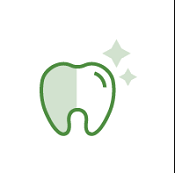Introduction
Bruxism, commonly known as teeth grinding or jaw clenching, is a condition that affects a significant portion of the population. It is characterized by the involuntary grinding, gnashing, or clenching of teeth, often during sleep. While occasional teeth grinding may not cause harm, chronic bruxism can lead to various dental and health issues. In this blog post, we will delve into the causes, symptoms, and impact of bruxism, providing you with a comprehensive understanding of this condition.
What is Bruxism?
Bruxism is a condition characterized by the involuntary grinding, clenching, or gnashing of teeth. It is a common dental problem that affects both children and adults. Bruxism can occur during the day or night, with the latter being more prevalent and often referred to as sleep bruxism.
Causes of Bruxism
The exact cause of bruxism is still unknown, but several factors have been identified as potential contributors:
1. Stress and Anxiety
Psychological factors such as stress, anxiety, and tension are believed to play a significant role in the development of bruxism. Individuals who are prone to high levels of stress or have difficulty managing their emotions are more likely to grind their teeth.
2. Malocclusion
Malocclusion, or misalignment of the teeth, can lead to bruxism. When the upper and lower teeth do not fit together properly, it can cause excessive grinding or clenching in an attempt to find a comfortable bite position.
3. Medications and Substances
Certain medications, such as antidepressants, can increase the risk of bruxism. Additionally, the consumption of alcohol, caffeine, or recreational drugs may also contribute to teeth grinding.
4. Sleep Disorders
Bruxism is often associated with sleep disorders like sleep apnea. The interruption of normal sleep patterns can trigger teeth grinding during the night.
Symptoms of Bruxism

Bruxism can manifest in various ways, and the symptoms may vary from person to person. Some common signs of bruxism include:
1. Teeth Grinding
The most obvious symptom of bruxism is the grinding or clenching of teeth, which can be loud enough to wake a sleeping partner.
2. Jaw Pain and Headaches
Bruxism can cause jaw pain, facial muscle soreness, and frequent headaches, especially in the morning.
Summary
Bruxism is a prevalent condition that involves the grinding, gnashing, or clenching of teeth, primarily during sleep. It can be caused by various factors, including stress, anxiety, misaligned teeth, and certain medications. Common symptoms of bruxism include tooth sensitivity, jaw pain, headaches, and worn-down teeth. If left untreated, bruxism can lead to severe dental problems such as tooth fractures, enamel erosion, and temporomandibular joint disorders. It can also affect one’s quality of sleep and overall well-being. Therefore, it is crucial to recognize the signs of bruxism and seek appropriate treatment to preven check here t further complications.
- Q: What is bruxism?
- A: Bruxism is a condition characterized by teeth grinding or clenching, often unconsciously, which can occur during the day or while sleeping.
- Q: What are the causes of bruxism?
- A: The exact causes of bruxism are not fully understood, but it can be attributed to factors such as stress, anxiety, misaligned teeth, sleep disorders, or certain medications.
- Q: What are the symptoms of bruxism?
- A: Common symptoms of bruxism include teeth grinding or clenching sounds during sleep, worn-down teeth, jaw pain, headaches, facial muscle soreness, and disrupted sleep patterns.
- Q: How does bruxism impact oral health?
- A: Bruxism can lead to various oral health issues such as tooth sensitivity, tooth fractures, enamel erosion, gum recession, jaw disorders, and temporomandibular joint (TMJ) problems.
- Q: Can bruxism be treated?
- A: Yes, bruxism can be managed and treated. Dentists may recommend wearing a mouthguard during sleep, stress management techniques, behavior therapy, muscle relaxation exercises, or addressing any underlying dental or sleep-related issues.
- Q: Is bruxism a common condition?
- A: Yes, bruxism is a fairly common condition. It affects both children and adults, with estimates suggesting that around 8-31% of the population experiences bruxism at some point in their lives.

Welcome to my website! My name is Jonathan Northcote, and I am a dedicated and experienced Dental Technician specializing in Dental Beautification, Wisdom Tooth Extraction, and Teeth Grinding Solutions. With a passion for creating beautiful smiles and improving oral health, I am committed to providing exceptional dental care and solutions to my patients.

